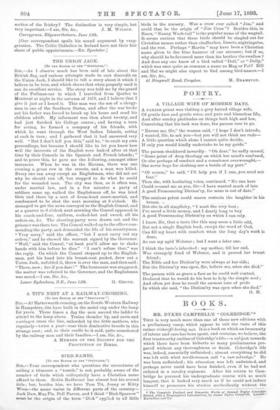POETRY.
A VILLAGE WIFE OF MODERN DAYS. A PARISH priest was visiting a grey haired village wife, Of gentle face and gentle voice, and pure and blameless life,. And after sundry platitudes on things both high and low, Conceiving that his task was done, the parson rose to go.
"Excuse me, Sir," the woman said, " I hope I don't intrude,. I wanted, Sir, to ask you—but you will not think me rude— A little question which alone I cannot quite decide, If only you would kindly undertake to be my guide."
The parson shuddered inwardly : "Oh dear," he sadly mused; "Some point of deep theology on which her mind's confused, Or else perhaps of conduct and a conscience overwrought,— She never begs for clothing nor a bottle of my port."
"Of course," he said, "I'll help you if I can, you need not fear."
Then she, with hesitating voice, continued, " No one here Could counsel me as you, Sir—I have wanted much of late A good Pronouncing Diction'ry, for mine is out of date."
The anxious priest could scarce restrain the laughter in his
breast. y
But she in all simplicity, " I want the very best ; I've saved a little money, and I dearly long to buy A good Pronouncing Diction'ry on which I can rely.
I know, Sir, that a taste like this may seem a little odd, But not a single English book, except the word of God,
Can fill my heart with comfort when the long day's work in
done,
As can my aged Webster ; but I want a later one.
I think the taste's inherited : my mother, till her end, Was strangely fond of Webster, and it proved her truest friend ; The Bible and her Diction'ry were always at her side ; But the Diction'ry was open, Sir, believe me, when she died.'
The parson with as grave a face as he could well control, Declared that be would do his best to help the simple soul; And often yet does he recall the earnest tone of pride In which she said, " the Diction'ry was open when she died."
G. H.


































 Previous page
Previous page